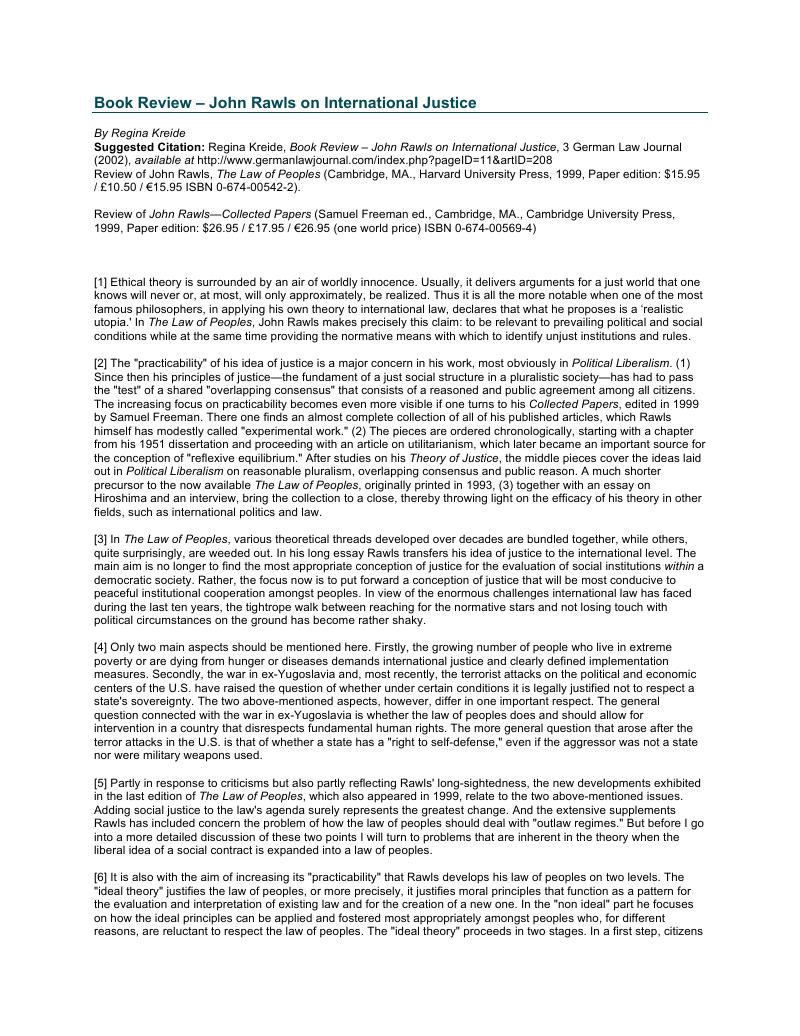Published online by Cambridge University Press: 06 March 2019

(1) Rawls, John, Political Liberalism 9 (1993).Google Scholar
(2) John Rawls—Collected Papers (Samuel Freeman ed., 1999).Google Scholar
(3) Rawls, John, “The Law of Peoples,” in On Human Rights – The Oxford Amnesty Lectures (Stephen Shute and Susan Hurley eds., 1993); reprinted in John Rawls – Collected Papers (Samuel Freeman ed., 1999).Google Scholar
(4) Rawls, John, Political Liberalism 24 (1993).Google Scholar
(5) Rawls, John, The Law of Peoples 25 (1999).Google Scholar
(6) Rawls, John, The Law of Peoples 64 (1999).Google Scholar
(7) Rawls, John, The Law of Peoples 37 (1999).Google Scholar
(8) Rawls, John, The Law of Peoples 65 (1999).Google Scholar
(9) It reads: “Though they [the rational representatives of liberal peoples] do know that reasonable favourable conditions obtain that makes constitutional democracy possible – since they know they represent liberal societies […]” John Rawls, The Law of Peoples 32-33 (1999).Google Scholar
(10) Rawls, John, The Law of Peoples 40 (1999).Google Scholar
(11) Rawls, John, “The Law of Peoples,” in On Human Rights – The Oxford Amnesty Lectures 1993 66 (Stephen Shute and Susan Hurley eds.,1993).Google Scholar
(12) Rawls, John, Political Liberalism 54ff. (1993).Google Scholar
(13) Thomas McCarthy comes to a similar conclusion in: Thomas McCarthy, “Über die Idee eines vernünftigen Völkerrechts,” in Frieden durch Recht. Kants Friedensidee und das Problem einer neuen Weltordnung 212ff. (Lutz-Bachmann, Matthias/Bohman, James, 1996). See also, the English edition published by the same authors, Perpetual Peace (Studies in Contemporary German Social Thought) (1997).Google Scholar
(14) Chen, Shaoshua and Ravallion, Martin, “How did the world's poorest fare in the 1990s?” Development Research Group, World Bank, 2000, http://econ.worldbank.org/docs/1164.pdf, and see also www.worldbank.org/research/povmonitor Google Scholar
(15) Rawls, John, The Law of Peoples 106 et. seq. (1999).Google Scholar
(16) Rawls, John, The Law of Peoples 119 et. seq. (1999).Google Scholar
(17) Rawls, John, The Law of Peoples 117 (1999).Google Scholar
(18) Roemer, John, Theories of Distributive Justice (1996).Google Scholar
(19) Roemer, John, Equality of Opportunity (1998).Google Scholar
(20) See also, Thomas Pogge's suggestions. Thomas Pogge, “Priorities of Global Justice,” in Global Justice (Thomas Pogge ed.,2001).Google Scholar
(21) Rawls, John, The Law of Peoples 42 (1999).Google Scholar
(22) As already spelled out in the International Convention on Economic, Social and Cultural Rights. The convention came into force in January, 1966, establishing the rights of every individual to a decent standard of living; to a just organization of labor; to social security under conditions of unemployment, illness, disability or old age; to employment opportunities and to the protection of the family. Nevertheless, despite some progress in more precisely defining these rights, the current human rights legislation is still wanting in a number of important respects, a situation resulting not least from a lack of clearly defined international implementation measures. Philip Alston, “Making Economic and Social Rights Count: a Strategy for the Future,” 1997 Political Quarterly 188.Google Scholar
(23) See also, O'Neill, Onora, “Transnational Justice,” in Political Theory Today 276-304 (David Held ed., 1991). For a German translation, see, Onora O'Neill, “Transnationale Gerechtigkeit,” in Philosophie der Menschenrechte (Stefan Gosepath and Gerog Lohmann eds., 1998).Google Scholar
(24) For the citation of the text passage in Rawls, see footnote 11.Google Scholar
(25) Rawls, John, The Law of Peoples 93 fn. 6 (1999).Google Scholar
(26) The London Agreement and Charter is reprinted, in Henry Steiner and Philip Alston, International Human Rights in Context 100ff. (1996).Google Scholar
(27) The General Treaty for the Renunciation of War of 27 August 1928 was the first that condemns war as an instrument of national policy and states that those who wage such a war are committing a crime.Google Scholar
(28) For further information see www.iccnow.org.Google Scholar
(29) 21 abstentions were counted. The states that have refused to sign the Rome Statute are China, Iraq, Qatar, and Libya. Among those states which already signed the Rome Statute are Algeria, Bosnia and Herzegovina, Egypt, the Federal Republic of Yugoslavia, the Russian Federation, Sudan, the Syrian Arab Republic, and the United Arab Emirates. See for detailed information www.iccnow.org.Google Scholar
(30) The USA has launched a so-called American Service Member Protection Act, created just to torpedo any further cooperation of the USA with the Court: it allows for force to be used to free any American soldier if he ever should appear as a suspect before the court. See the www.iccnow.org.Google Scholar
(31) See also, the comprehensive book of Geoffrey Robertson, Crimes against Humanity – The Struggle for Global Justice (2000).Google Scholar
(32) This, in turn, can lead to the application of the principle of collective defense as defined in Article 5 of the Washington Treaty, which indeed happened a short time after the attacks.Google Scholar